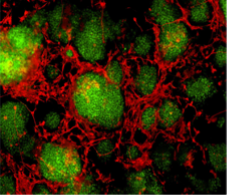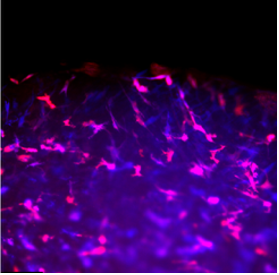 Molecular and Cellular Bioengineering involves the development of polymeric biomaterials along with gene/cell/drug therapies to treat conditions including cancer, cardiovascular diseases, neurodegeneration, and musculoskeletal diseases. Broadly, training in this domain operates in four primary engineering sub-disciplines that integrate deeply with one another: biomaterial and therapeutic design, synthetic biology, mechanobiology, and immunoengineering. Biomaterial and therapeutic design involves the application of known and novel materials to probe basic scientific hypotheses and to engineer targeted therapies across multiple length scales—macro, micro, and nano—and numerous disease states that include cancer, musculoskeletal diseases, and cardiovascular diseases. The goals are to produce transformative new classes of treatments to provide safer and more effective drugs and medical products. In the area of synthetic biology,
Molecular and Cellular Bioengineering involves the development of polymeric biomaterials along with gene/cell/drug therapies to treat conditions including cancer, cardiovascular diseases, neurodegeneration, and musculoskeletal diseases. Broadly, training in this domain operates in four primary engineering sub-disciplines that integrate deeply with one another: biomaterial and therapeutic design, synthetic biology, mechanobiology, and immunoengineering. Biomaterial and therapeutic design involves the application of known and novel materials to probe basic scientific hypotheses and to engineer targeted therapies across multiple length scales—macro, micro, and nano—and numerous disease states that include cancer, musculoskeletal diseases, and cardiovascular diseases. The goals are to produce transformative new classes of treatments to provide safer and more effective drugs and medical products. In the area of synthetic biology,  the goal is to produce regenerative engineering strategies that enable living cellular therapeutics to provide feedback-controlled, on-demand therapies for diseases of the musculoskeletal, central nervous, and immune systems. Mechanobiology is used to understand cell-cell and cell-matrix interactions that contribute to disease progression—including heart valve calcification, cardiopulmonary fibrosis, and kidney disease—to identify novel targets for therapy. Lastly, in the area of immunoengineering, methods in biomaterial design, and cell/gene therapies are used to harness the immune system for applications ranging from cancer therapeutics, improved vaccine design, and autoimmune disease treatments.
the goal is to produce regenerative engineering strategies that enable living cellular therapeutics to provide feedback-controlled, on-demand therapies for diseases of the musculoskeletal, central nervous, and immune systems. Mechanobiology is used to understand cell-cell and cell-matrix interactions that contribute to disease progression—including heart valve calcification, cardiopulmonary fibrosis, and kidney disease—to identify novel targets for therapy. Lastly, in the area of immunoengineering, methods in biomaterial design, and cell/gene therapies are used to harness the immune system for applications ranging from cancer therapeutics, improved vaccine design, and autoimmune disease treatments.
BME Core Faculty in Molecular and Cellular Bioengineering
BME Affiliated Faculty in Molecular and Cellular Bioengineering
- Deb Lannigan
- Ethan Lippmann
- Marjan Rafat
- John Wilson